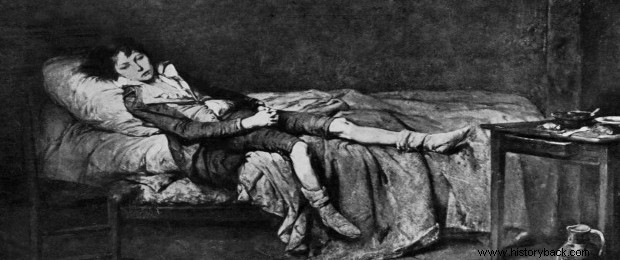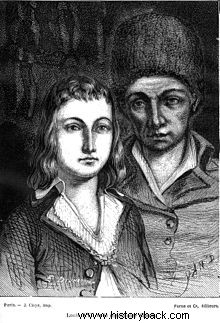
Louis Charles of Bourbon prisoner in the Temple
When and how he died Louis Charles of Bourbon , son of Louis XVI and Marie Antoinette , legitimate heir to the throne of France?
The fate of the prince, known as the "child of the Temple “, Is one of the most great puzzles of the last two centuries.
We certainly know that the little one, in the summer of 1793, was literally torn from the arms of his mother and other family members to be taken to another cell, entrusted to the very unloving care of the cobbler Antoine Simon , a violent drunkard who had the task of "educating" the royal scion in the revolutionary way, by hook or by crook.
Some creepy aspects of his imprisonment (about which he will return in special posts), largely told later by his elder sister:not only was the child taught profanity, blasphemies and scurrilous songs, not only was he regularly beaten and harassed by continuous threats and blackmail, but he was even forced to sign, obviously without realizing what did, a document in which he claimed to have had incestuous relations with his mother, which certainly represented the most sinister aspect of the trial of Marie Antoinette, in practice a farce.

Louis Charles prisoner in the Temple with his "tutor" Antoine Simon
Returning to Louis Charles, at the beginning of 1794, luckily for him Simon, probably because he had already diligently discharged his duty, disappeared, only that the child, from that moment on, was completely abandoned to himself.
It is impossible for us to enter the mood or only remotely imagine the anguish that day after day must have gripped the mind of this little boy brutally deprived of his dearest affections and forced to suffer oppression of all kinds by unscrupulous strangers and conscience, the fact is that he could not resist for long and the 8 June 1795 , just 10 years old, he died.
The cause of death was attributed to a ' infection , given the persistence for more than a week of high fever and given the precarious hygienic conditions of the prison, infested with mice, ticks and fleas.
At least this is the official version on what would have happened to the third son of the last sovereigns of France before the outbreak of the Revolution, but the conditional is a must, because there are not a few historians who, citing more or less acceptable reasons and evidence, do not accept this version of the facts, for a much happier ending, with a child who survived the darkest moments of the Terror and later happy for a long time in absolute anonymity, away from court and politics.
The topic is mysterious and very interesting, which is why I will deal with it again shortly.
